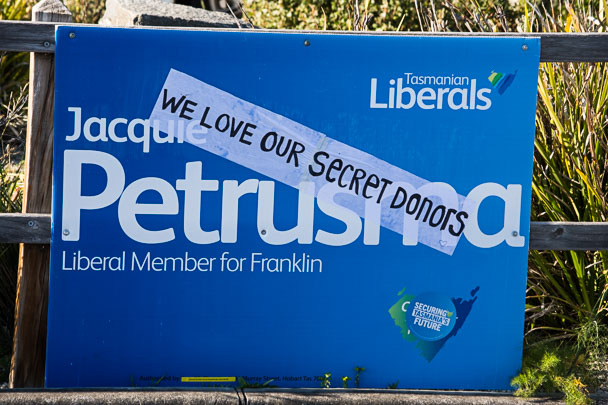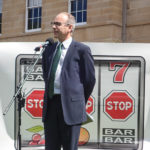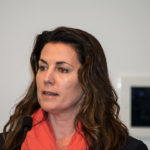Tasmanian government plans donations disclosure threshold for MPs 100 times greater than for councillors

A Tasmanian Government proposal to limit mandatory public disclosure of donations to state political parties and candidates to sums greater than $5000 has alarmed advocates for reform.
The disclosure threshold in draft legislation released by the government is 100 times greater than applies to local government councillors and five times higher than recommended by the Integrity Commission.
Since August 2018, councillors have been required to disclose gifts and donations of more than $50.
In a submission to the review of the state’s electoral act, the Integrity Commission said donation disclosure threshold “should be no higher than $1000”. Queensland, NSW, Western Australia, the Northern Territory and the ACT all have donation disclosure thresholds of $1000, while Victoria’s is set at $1040.
Asked by Tasmanian Inquirer why the government had settled on $5000, the figure at the highest end of the range of possible disclosure thresholds he had flagged in February, Premier Peter Gutwein said he had followed a lead set by South Australia.
“I looked around at what was occurring around the country. The South Australians have a donations disclosure level of above $5000. $5000 seemed about right,” Gutwein said.
“Why does the Premier know better than the Integrity Commission?” Roland Browne, Election Funding Reform.
The South Australian Liberal Party’s financial return for 2019-20, the most recent year for which data is available, showed it had income of $3.1 million. But data submitted by the party to the state’s electoral commission revealed only 10 donors made donations above the $5381 threshold. Together, they contributed $730,055 - less than one-quarter of the party’s total revenue.
A spokesperson for Gutwein declined to explain why the Integrity Commission recommendation had been rejected.

Roland Browne. Photo: Bob Burton.
Roland Browne, a director of Election Funding Reform, a group pushing for greater political donations transparency, said he disagreed with the government’s proposed threshold.
“Why does the premier know better than the Integrity Commission?” he said.
The government’s proposed threshold is at odds with most public submissions to the Electoral Act Review. A report reviewing the submissions said: “A threshold of $1,000 would be in line with the majority of submitters to the review as well as the general trend in other jurisdictions.”
Government changes stance and includes Legislative Council in disclosure provisions
Releasing the review in mid-February, Attorney-General Elise Archer and Premier Peter Gutwein said the disclosure threshold would be between $1000 and $5000 and “further modelling” would be undertaken “to determine the best approach for Tasmania”.
Tasmanian Inquirer requested a copy of the modelling, but the government declined to provide a copy. Instead, it said it had “released a draft bill for consultation based on the departmental advice received – this is standard practice when considering and developing legislation.”
Browne called on the government to release the modelling. “We were told in February the modelling would inform the development of disclosure and donation limits in the bill,” he said. “How can we evaluate the bill and the limits without the modelling?”
After questioning by Tasmanian Inquirer on why the Legislative Council was excluded from the donation disclosure regime, the government reversed its position and proposed candidates for upper house seats also be required to disclose donations above a $5000 threshold. It is proposing Legislative Council candidates not be eligible for public funding.
All parties support the retention of a campaign expenditure limit for Legislative Council candidates, which will be $18,500 for seats up for election in 2022.

Meg Webb, Legislative Council member for Nelson.
Meg Webb, the member for the Legislative Council seat of Nelson, welcomed the extension of the disclosure requirements to the upper house but said reducing the threshold to $1000 was critical.
“A $1000 threshold is needed to guarantee a far higher degree of transparency and ensure potential conflicts of interest are disclosed,” she said.
Where the threshold is ultimately set will depend on the fate of amendments in the Legislative Council. Shadow Attorney-General, Ella Haddad, said Labor believed the disclosure threshold should be $1000.
“We will be making this position clear in our submission to the government’s consultation on the draft bills and if the final bill does not include a threshold of $1000 or lower, we will seek to amend it to lower it to $1000,” she said.
Webb expressed concern the government had proposed public funding of parties and candidates contesting House of Assembly seats without imposing any cap on campaign expenditure.
“This means the major parties can raise an unlimited amount of donations, the bulk of which would be undisclosed if a high threshold is adopted, and still be paid public funding on top of them,” she said.
“Rather than levelling the playing field and improving transparency, this is a system designed to entrench the funding base for the major parties, but disadvantage minor parties and independents.”
Browne said the role of public funding should be to take private money out of politics. “This government is yet to comprehend how corrupted the Tasmanian political donation system has become. While their proposed reforms have some good points, with this bill we’ll see massive undisclosed donations, anonymous donations and unlimited expenditure backed with public financing,” he said.
“The system will be open to be gamed by the same forces that game it every election.”
The government has released the exposure draft of the bill for public comment, with the aim of it being debated in parliament before the end of the year.
Public submissions are open until 5pm on Tuesday September 28. Election Funding Reform has also created a submission portal on the proposed bill.
 @BobBurtonoz
@BobBurtonoz